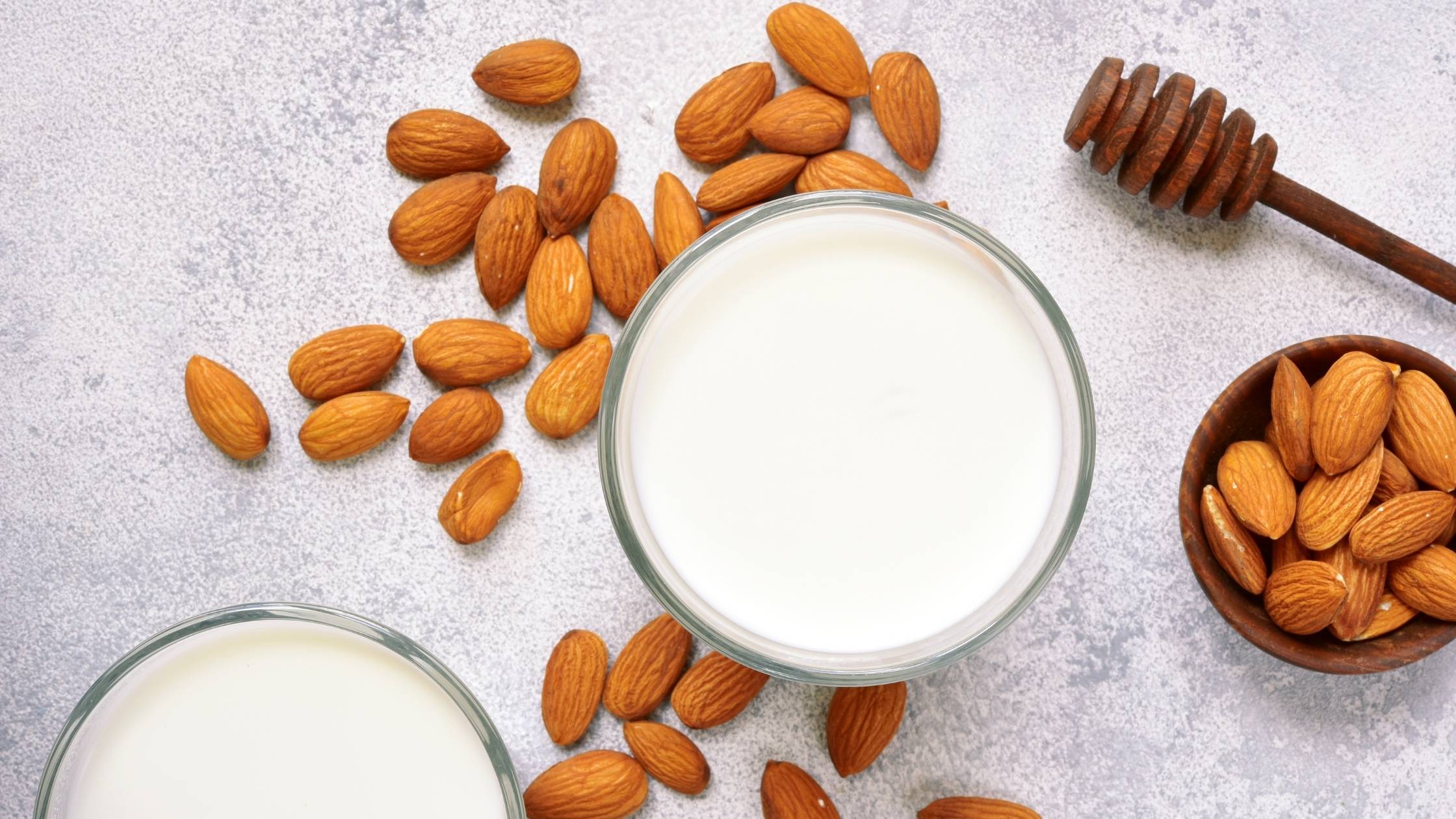As a dog owner, you want to provide your furry friend with the best possible nutrition. That means feeding them a healthy diet that meets their specific needs. But what about almond milk? Can dogs drink almond milk? The answer is yes, but there are a few things you need to know before you give it to your dog.
Almond milk is a plant-based milk made from almonds. It is a good source of vitamins and minerals, including calcium, vitamin D, and vitamin E. It is also low in calories and fat, making it a good choice for dogs who are overweight or have diabetes.
Introduction
Providing dogs with a healthy diet is crucial for their overall well-being and longevity. As pet owners, it’s essential to understand the nutritional needs of our furry companions and make informed choices about their food and treats.
Almond milk, a plant-based milk alternative, has gained popularity in recent years due to its potential health benefits for humans. But can dogs have almond milk? Let’s explore the potential benefits and considerations regarding almond milk consumption for dogs.
Potential Benefits
Almond milk contains several nutrients that can be beneficial for dogs, including:
- Vitamin E: An antioxidant that supports immune function and skin health.
- Calcium: Essential for strong bones and teeth.
- Potassium: Helps regulate blood pressure and muscle function.
- Fiber: Aids in digestion and can help maintain a healthy weight.
Nutritional Value of Almond Milk
Almond milk is a plant-based milk made from almonds that have been soaked and blended with water. It is a popular alternative to cow’s milk, especially among people who are lactose intolerant or vegan.Almond milk is a good source of several nutrients, including vitamin E, calcium, and potassium.
It is also low in calories and saturated fat. Compared to cow’s milk, almond milk has less protein and calcium, but it is higher in vitamin E and potassium.
Nutritional Content of Almond Milk
The following table shows the nutritional content of one cup (240 ml) of unsweetened almond milk:| Nutrient | Amount ||—|—|| Calories | 30 || Fat | 2.5 grams || Saturated fat | 0 grams || Cholesterol | 0 milligrams || Sodium | 180 milligrams || Carbohydrates | 16 grams || Fiber | 1 gram || Sugar | 7 grams || Protein | 1 gram || Vitamin D | 0 IU || Calcium | 450 milligrams || Potassium | 180 milligrams || Vitamin E | 50 IU |
Safety Considerations

While almond milk is generally safe for dogs in moderation, there are a few potential risks to consider.
One concern is that almond milk is high in fat, which can lead to weight gain and digestive upset in some dogs. Additionally, almond milk contains small amounts of oxalates, which can be harmful to dogs in large quantities. Oxalates can bind to calcium and prevent it from being absorbed, which can lead to kidney stones and other health problems.
Introducing Almond Milk into a Dog’s Diet
If you decide to give your dog almond milk, it is important to introduce it slowly and gradually. Start by offering your dog a small amount of almond milk (about 1/4 cup) and observe them for any signs of digestive upset.
If your dog tolerates the almond milk well, you can gradually increase the amount you give them.
Appropriate Amount of Almond Milk for Dogs
The amount of almond milk you give your dog will depend on their size and activity level. As a general rule of thumb, you should not give your dog more than 1/2 cup of almond milk per day.
Alternative Milk Options

While almond milk can be a safe and nutritious option for dogs, there are other types of milk that are also suitable for canine consumption. Each milk alternative has its own unique nutritional profile and safety considerations, so it’s important to weigh the pros and cons before choosing the best option for your furry friend.
Cow’s Milk
Cow’s milk is a common choice for dogs, as it is widely available and relatively inexpensive. It is a good source of protein, calcium, and other essential nutrients. However, some dogs may be lactose intolerant, which can cause digestive issues such as diarrhea and vomiting.
If your dog is lactose intolerant, you can give them lactose-free cow’s milk or another type of milk that is easier to digest.
Goat’s Milk
Goat’s milk is another good option for dogs, as it is easier to digest than cow’s milk and contains less lactose. It is also a good source of protein, calcium, and other nutrients. Goat’s milk may be a good choice for dogs with sensitive stomachs or lactose intolerance.
Soy Milk
Soy milk is a plant-based milk that is made from soybeans. It is a good source of protein, calcium, and other nutrients. However, soy milk is not as nutritionally complete as cow’s milk or goat’s milk, so it is important to supplement your dog’s diet with other sources of nutrients if you choose to give them soy milk.
Coconut Milk
Coconut milk is a plant-based milk that is made from the meat of coconuts. It is a good source of fat, protein, and other nutrients. However, coconut milk is high in calories and fat, so it should be given to dogs in moderation.
Coconut milk may be a good choice for dogs with sensitive stomachs or lactose intolerance.
Conclusion
In summary, almond milk can be a safe and occasional treat for dogs in moderation. Its low lactose content and nutritional profile make it a potentially beneficial alternative to cow’s milk. However, it’s crucial to prioritize your dog’s overall health and consult with a veterinarian before incorporating almond milk into their diet.
For dog owners considering feeding their dogs almond milk, it’s recommended to:
- Introduce it gradually in small amounts to monitor for any adverse reactions.
- Avoid using sweetened or flavored almond milk, as these may contain harmful ingredients.
- Consider using unsweetened, plain almond milk and dilute it with water to reduce the fat and calorie content.
- Be mindful of your dog’s individual needs and consult with a veterinarian if you have any concerns or notice any changes in their health after consuming almond milk.
Conclusion
Overall, almond milk can be a healthy and nutritious treat for your dog. However, it is important to introduce it slowly and monitor your dog for any adverse reactions. If you have any concerns, talk to your veterinarian before giving your dog almond milk.
FAQ Section
How much almond milk can I give my dog?
The amount of almond milk you can give your dog will depend on their size and activity level. A good rule of thumb is to start with a small amount, such as 1/4 cup, and gradually increase the amount as needed.
Can I give my dog almond milk every day?
Yes, you can give your dog almond milk every day, but it is important to do so in moderation. Too much almond milk can cause diarrhea.
What are the benefits of almond milk for dogs?
Almond milk is a good source of vitamins and minerals, including calcium, vitamin D, and vitamin E. It is also low in calories and fat, making it a good choice for dogs who are overweight or have diabetes.
What are the risks of giving my dog almond milk?
The main risk of giving your dog almond milk is that it can cause diarrhea. This is because almond milk is a high-fat food, and dogs can have difficulty digesting it. If your dog has diarrhea after drinking almond milk, stop giving it to them and talk to your veterinarian.




